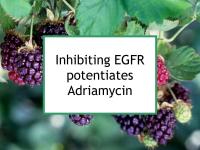Epithelial growth factor receptor (EGFR) is a cell surface receptor that transmits extracellular messages into the cell, thereby altering intracellular functions. Aberrant EGFR activation has been shown to have an important role in the development and progression of various cancers, including breast cancer.
EGFR overexpression is common in breast cancer, particularly triple negative (ER-/PR-/HER2-) disease. This has led to development of EGFR inhibitors as a treatment strategy. Now a new study has reported that the treatment effectiveness of doxorubicin chemotherapy can be increased in both hormone receptor positive (ER+/PR+) and triple negative breast cancer cells by adding an EGFR inhibitor. While the study used an investigational EGFR inhibitor, there are also a number of foods that can help inhibit EGFR.
Foods that act as EGFR inhibitors
The following foods (or their important component micronutrients) have been found to inhibit EGFR without interfering with doxorubicin treatment, as well as having been shown to reduce the risk of breast cancer in general:
- Arugula
- Blackberries
- Blueberries
- Bok choy
- Boysenberries
- Broccoli
- Brussels sprouts
- Buckwheat
- Cabbage, especially red
- Carrots, purple
- Cauliflower
- Celery
- Cherries
- Collard greens
- Cranberries
- Currants, black
On the other hand, exposure to bisphenol A (BPA) has been reported to activate EGFR in estrogen receptor negative inflammatory breast cancer (IBC) cells.
Latest research finds EGFR inhibition potentiates doxorubicin
The study referenced above was designed to investigate the potential synergistic effects of an investigational EGFR inhibitor (EGFRi) in combination with doxorubicin in both MCF-7 (ER+/PR+) and MDA-MB-231 (triple negative) breast cancer cells.
The exposure of MDA-MB-231 and MCF-7 cells to EGFRi alone produced IC50s of 6.03 µM and 3.96 µM cytotoxicity, respectively. IC50 refers to the dose of a drug required to produce 50% of a maximum response. Doxorubicin alone produced IC50 9.67 µM and IC50 1.4 µM, respectively.
Combining EGFRi with doxorubicin significantly reduced the IC50 in both MCF-7 (0.46 µM) and MBA-MB 231 (0.01 µM) cells. The presence of synergistic drug effects in both cell lines were confirmed using further analysis. EGFRi and doxorubicin downregulated EGFR gene expression individually and in combination in both cell types. The authors conclude that EGFRi has the potential to produce synergistic interactions with doxorubicin, inhibiting growth, inducing apoptosis (programmed cell death), and downregulating EGFR in both hormone receptor positive and triple negative breast cancer cells.
